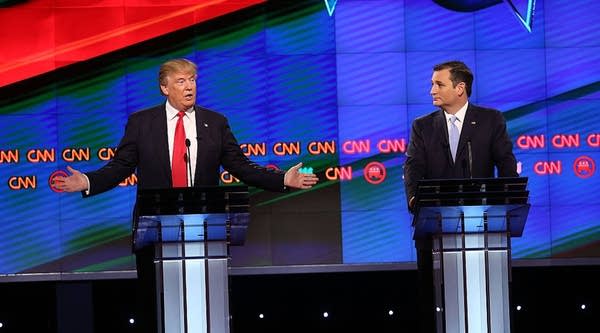Does trade kill jobs or create them? Yes.
Trade both creates and destroys jobs

Free trade and trade agreements made an appearance at last night’s more-civil-than-usual republican debate. Ted Cruz and Donald Trump argued that trade deals are sending jobs overseas, Marco Rubio and John Kasich had more qualified criticisms of trade deals.
Do big trade agreements kill jobs? Or do they actually create them? The answer is: Yes.
“Any trade agreement does kill some jobs but also creates other jobs,” said Robert Lawrence, professor of international trade and investment at Harvard’s Kennedy School. In principle it’s pretty straightforward. Trade barriers go down, everyone competes. Some foreign companies will beat out American ones, some American companies will beat out foreign ones.
Lawrence and many other economists argue that the jobs that are created are better, higher paying, and more productive jobs than the ones that are lost. “It’s the most productive firms that get to export, and they expand their employment and so more workers are working in high productivity jobs,” he said.
The people whose jobs are displaced, however, are not necessarily going to be able to get the types of jobs that are created.
If you ask whether big trade agreements kill more jobs than they create, you get different answers. Take the North American Free Trade Agreement (NAFTA).
“My estimate is that it eliminated almost 700,000 jobs in the United States, that is a net estimate,” said Robert E. Scott of the Economic Policy Institute. He attributes the loss to rising trade deficits with Mexico.
Jeffrey Schott, economist with the Peterson Institute for International Economics, argued Scott’s models were simplistic and that trade deficits do not equate to job losses. “There was a big boost in employment in the years following NAFTA but just as NAFTA was not the reason for this big increase in employment, neither was it the cause of great losses,” he said. Likewise, Scott is critical of Schott’s models.
Ultimately, the reason why estimates are all over the place, said Schott, is that “it’s very difficult to show clear causality.”
Additionally, there are long term trends that are affecting manufacturing jobs around the globe that have nothing to do with trade agreements. “Trade has been nowhere near as significant as developments in technology, automation that have favored more skilled workers,” said Harvard’s Robert Lawrence.
Regardless of whether trade agreements create or kill more jobs, one thing economists of all kinds agree on is that for the people who do get displaced, losing your job is pretty awful. “The pain is concentrated,” said Lawrence.











